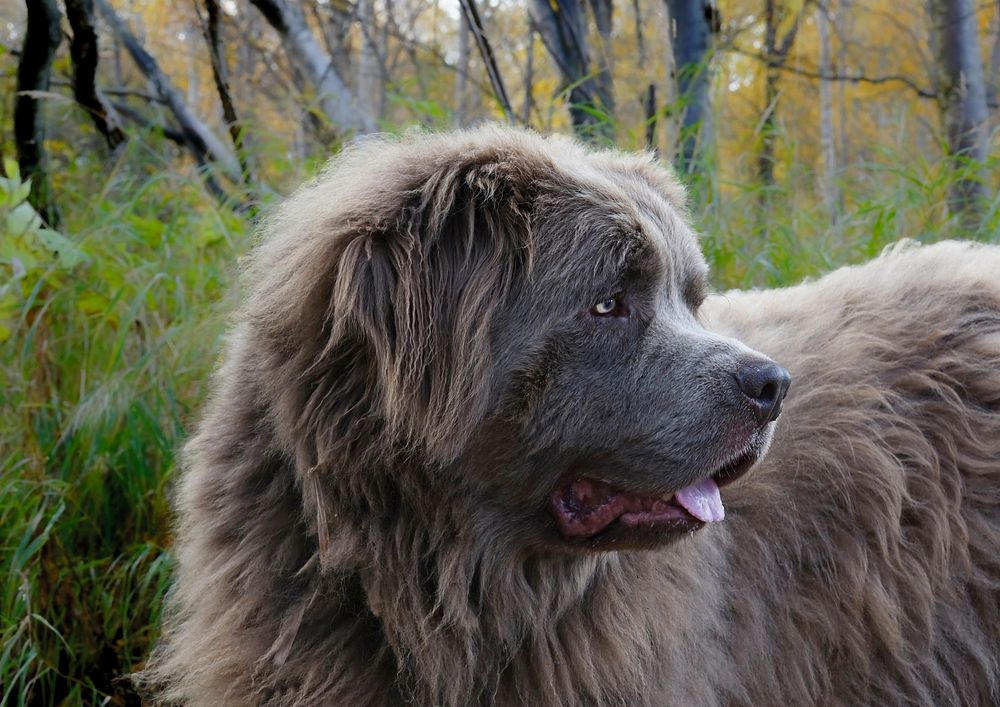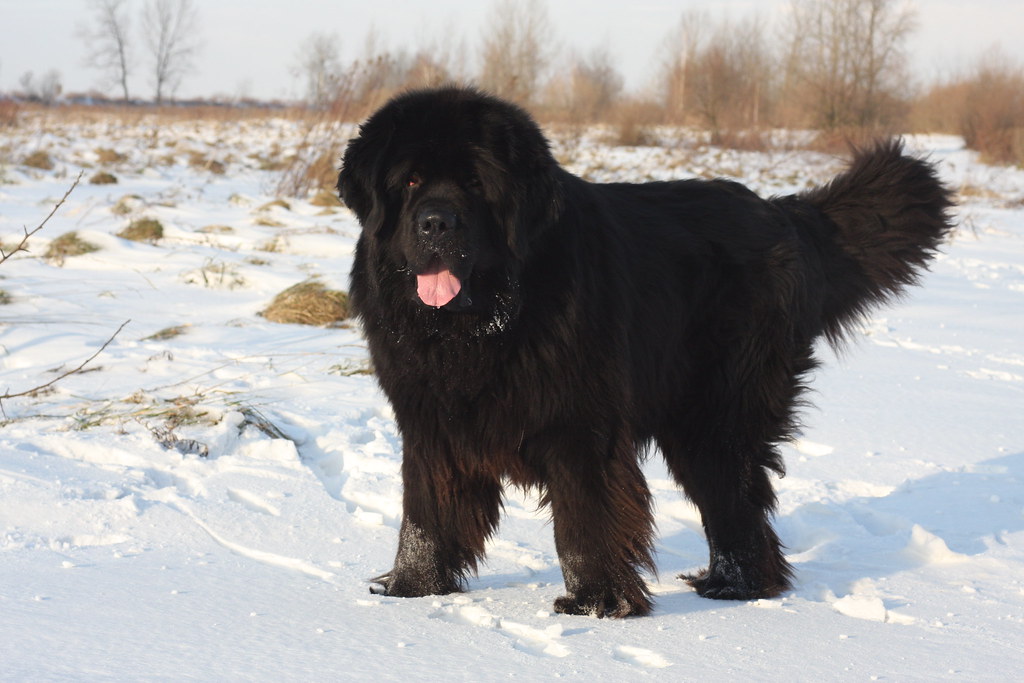Welcome to the world of Newfoundland dogs, where gentle giants with hearts of gold meet devoted families. Known for their sweet temperaments and impressive size, Newfoundlands are more than just large, fluffy pets; they are loyal companions who bring joy, protection, and an unshakeable bond to those who welcome them.
Originally from Newfoundland, Canada, these dogs have a rich history as hardworking fishermen’s helpers and heroic water rescuers. Today, their loving nature makes them ideal family pets, especially in households with children. However, owning a Newfoundland comes with unique responsibilities, including regular grooming, managing their diet, and ensuring ample exercise.
In this guide, we’ll explore the fascinating history of the Newfoundland breed, their physical characteristics, and personality traits. We’ll also provide essential tips on health care, training, and living with these magnificent dogs. Whether you’re considering adopting a Newfoundland or already have one, this overview will help you ensure a happy and healthy life for your gentle giant. Let’s discover what makes Newfoundlands truly special.
Key Takeaways
- Newfoundland dogs are gentle giants known for their sweet temperament, making them excellent family pets, especially in households with children.
- Regular grooming and health checks are crucial due to their size and thick coat; this includes managing their diet to prevent obesity and ensuring they get enough exercise.
- They thrive in environments where they have space to move and access to water, as they love swimming and have a natural ability to perform water rescues.
- When looking to bring a Newfoundland into your home, seek reputable breeders or adoption centers that can provide health clearances for both parents to avoid common genetic problems.
- Training and socialization from a young age are essential for Newfoundland dogs to ensure they grow into well-behaved and sociable adults.
- Despite their large size, Newfoundlands require companionship and do not like being left alone for long periods; they are most happy when included in family activities.
Breed Overview
History
The Newfoundland breed has its roots deeply embedded in the rugged, coastal region of Newfoundland, Canada. Here, they served as indispensable working dogs for fishermen, excelling in water-based tasks such as hauling nets and rescuing overboard sailors. Their exceptional swimming abilities and strength made them invaluable to the local communities.
The breed’s journey from a fisherman’s companion to a recognized purebred dog is marked by their introduction to Europe in the 18th century, where they captivated the public and royalty alike. By the 19th century, Newfoundlands were celebrated in both literature and high society, with notable figures like Lord Byron singing their praises. The American Kennel Club officially recognized them in 1886, cementing their status among esteemed dog breeds.
Physical Characteristics
Newfoundlands are known for their imposing size and strength. They possess a heavy bone structure that supports their muscular build. This breed also features unique webbed feet, which contribute to their exceptional swimming capabilities.
Their coat is another distinctive trait; it’s a thick, water-resistant double layer that protects them from harsh climates. Breed standards recognize several coat colors including black, brown, gray, and white-and-black (Landseer).
Personality and Temperament
These gentle giants are renowned for their kind and friendly demeanor. They make excellent family pets due to their patient nature with children. Their history as rescue dogs imparts them with a natural lifesaving instinct, making them protective of their home and loved ones without being aggressive.
Newfoundland dogs are intelligent and relatively easy to train but require consistent leadership. They thrive on companionship and do not like being left alone for long periods. Their sociable nature makes them well-suited for activities that involve interaction with people or other animals.
Health And Care
Common Health Issues
Newfoundlands are known for their gentle nature, but they come with certain health vulnerabilities. Hip dysplasia and heart problems are genetic conditions that commonly affect them. Regular health screenings play a crucial role in early detection, which can significantly improve the quality of life for these dogs. They are also prone to bloat, a serious condition that requires immediate attention. To prevent it, owners should follow best practices like feeding smaller meals throughout the day and avoiding exercise right after eating.
Dietary Needs
Given their large size, Newfoundlands have high-calorie needs to maintain their energy levels. A diet rich in proteins and fats is essential for supporting their active lifestyle. However, it’s important to monitor their food intake closely. Overfeeding can lead to obesity, which brings about a host of other health issues. Balanced nutrition is key to keeping these gentle giants healthy and happy.
Exercise Requirements
Regular, moderate exercise is vital for maintaining the health and happiness of Newfoundlands. Their build makes swimming an ideal form of exercise, providing both enjoyment and physical benefits without putting undue stress on their joints. However, care must be taken with puppies. Excessive exercise in young Newfoundlands can lead to joint issues later in life due to their rapid growth. Owners should ensure a well-measured approach to physical activity from an early age.
Grooming
Maintaining the coat of a Newfoundland requires consistent effort including regular brushing and bathing. This routine not only keeps them looking their best but also helps prevent skin issues by removing dirt and spreading natural oils throughout their coat. Ear cleaning and nail trimming are essential practices for preventing infections and other complications. Owners should be prepared for seasonal shedding; having the right tools on hand can manage this effectively.
Living with a Newfoundland
Training and Socialization
Training and socialization are crucial for Newfoundlands. These dogs need to start early socialization and obedience training to grow into well-behaved adults. Positive reinforcement techniques work best for them. Treats, praises, and playtime encourage good behavior.
However, Newfoundlands have a stubborn streak. This trait requires owners to be patient and consistent. Without these qualities, training can become challenging. But with the right approach, these dogs can excel in many areas.
Environment
Newfoundlands thrive in homes with plenty of space. They need room indoors to stretch out and a large yard for play. Their size and energy level make cramped spaces unsuitable.
These dogs adapt well to different climates but take precautions during extreme temperatures. In hot weather, ensure they have shade and water. In cold conditions, their thick coat provides natural insulation.
A water source nearby is beneficial for swimming, a favorite activity of Newfoundlands. Their love for water is innate, making access to a pool or lake ideal for their exercise needs.
Activities They Enjoy
Newfoundlands enjoy various activities that keep them physically and mentally stimulated:
- Swimming is at the top of their list due to their natural affinity for water.
- They also love hiking through trails, exploring new environments alongside their owners.
- Retrieving games satisfy their urge to fetch and carry items in their mouth.
Participating in dog sports like water trials and draft work offers great physical exercise and mental stimulation. These activities harness their strengths effectively.
Companionship activities such as therapy work bring joy not only to Newfoundlands but also to the people they help. Their gentle nature makes them excellent therapy dogs, providing comfort and support in various settings.
Breeder Advice and Adoption
Choosing a Breeder
When searching for Newfoundland breeders, prioritize those conducting health screenings. These tests are crucial to ensure the puppy you’re bringing home is healthy and less likely to develop genetic conditions common in the breed. Breeders who provide health guarantees offer an added layer of security, showcasing their confidence in their breeding program’s health standards.
It’s also essential to ask detailed questions about the puppy’s lineage and temperament. Understanding the puppy’s background can give insights into its future behavior and any potential health issues. Questions should cover both parents’ health history and any notable characteristics within the puppy’s lineage.
Visiting the breeding facility is a must. Observing the conditions first-hand allows you to see how the puppies and their parents live. A clean, well-maintained environment with plenty of space for play and socialization indicates a breeder who cares deeply for their dogs’ welfare.
Adoption
Adopting a Newfoundland from shelters or rescue organizations comes with significant benefits. It gives a second chance to dogs in need, many of whom are there through no fault of their own. Adoption can also be more cost-effective than purchasing from a breeder, covering initial veterinary fees like spaying/neutering, vaccinations, and microchipping.
When considering adopting an older Newfoundland, think about your ability to meet its needs. Older dogs may require more medical attention and could have ingrained behaviors that need addressing. However, they often transition smoothly into new homes, grateful for the comfort and stability offered.
Purebreds and mixes alike can be found in shelters or through rescue organizations, waiting for loving homes. These places often have Newfoundlands that were surrendered by owners unable to care for them or rescued from less-than-ideal situations. Adopting offers these gentle giants a chance at a happy life while providing families with unconditional love.
Misc.
Popular Names
Newfoundlands, with their majestic presence and gentle demeanor, often receive names that reflect these qualities. Bear, Moose, and Luna are popular choices among owners. These names capture the essence of their Canadian heritage and the natural grandeur associated with it.
Owners also consider names inspired by famous Newfoundlands in history. For example, Seaman, the loyal companion of explorer Meriwether Lewis, is a favored name. This trend pays homage to notable figures in Newfoundland history, cementing their legacy.
Fun Facts
Newfoundlands have a storied history of heroic rescues. Their swimming prowess is legendary, making them natural lifesavers. Anecdotes abound of Newfoundlands saving people from drowning, showcasing their bravery and strength.
In literature and movies, Newfoundlands have left an indelible mark. Nana from J.M. Barrie’s “Peter Pan” is perhaps the most famous literary Newfoundland. This breed has also excelled in unusual jobs like mail carrying in historical times, demonstrating their versatility and work ethic.
Common Myths
A common myth about Newfoundlands is that they are always black. However, the breed standard includes color variations such as brown, gray, and white-and-black (Landseer). This diversity adds to their appeal.
Another misconception is about their drooling habit. It varies by individual rather than being a breed-wide trait. Some may drool more than others due to factors like lip shape.
The notion that Newfoundlands are lazy couldn’t be further from the truth. They have a rich working dog heritage, thriving on activity and purposeful tasks.
Most Similar Breed
When comparing Newfoundlands to Labrador Retrievers, note the differences in size and coat length. Labradors are smaller with shorter coats but share a friendly temperament with Newfoundlands.
Saint Bernards share similarities in temperament and exercise needs with Newfoundlands but differ significantly in appearance and grooming requirements.
The Leonberger presents another similar breed option. They share traits like friendliness and strength but require more grooming due to their longer coat. Health issues also vary between these breeds.

Summary
The Newfoundland breed embodies a unique combination of gentle strength, loyal companionship, and an unwavering work ethic. This article has meticulously explored their characteristics, health considerations, and the nuances of living with such majestic animals. It also provided valuable insights into responsible breeding practices and adoption processes, ensuring potential owners are well-equipped to welcome these gentle giants into their homes. Their remarkable versatility as family pets, working dogs, and loving companions underscores the importance of understanding their specific needs and commitments involved in their care.
As stewards of this noble breed, it is imperative for prospective owners to approach Newfoundland ownership with a sense of responsibility and informed decision-making. The journey with a Newfoundland offers unparalleled rewards, fostering a deep bond built on mutual respect and care. Readers are encouraged to reflect on the comprehensive information provided and consider how they can contribute to the well-being and preservation of these magnificent dogs. Embrace the opportunity to be part of the Newfoundland community, enriching your lives with their affectionate and protective presence.
Frequently Asked Questions
What is the average lifespan of a Newfoundland?
Newfoundlands typically live between 8 to 10 years. Providing them with proper healthcare and nutrition can help maximize their lifespan.
How much exercise does a Newfoundland need?
A Newfoundland requires moderate exercise, such as daily walks and occasional swimming, to maintain its health and happiness.
Are Newfoundlands good with children?
Yes, Newfoundlands are known for their gentle and patient nature, making them excellent companions for children.
What are common health issues in Newfoundlands?
Common health issues include hip dysplasia, heart problems, and bloat. Regular veterinary check-ups are essential for early detection and management.
How often should a Newfoundland be groomed?
Newfoundlands should be groomed weekly to manage their thick coats and reduce shedding. During shedding season, more frequent grooming may be necessary.
Is it better to adopt a Newfoundland or buy from a breeder?
Adoption is a great option for giving a Newfoundland a second chance at life. However, if choosing a breeder, ensure they are reputable and prioritize the health and welfare of their dogs.
Can Newfoundlands live in hot climates?
Newfoundlands can struggle in hot climates due to their thick fur. Providing ample shade, air conditioning, and water is crucial in warmer environments.








0 Comments